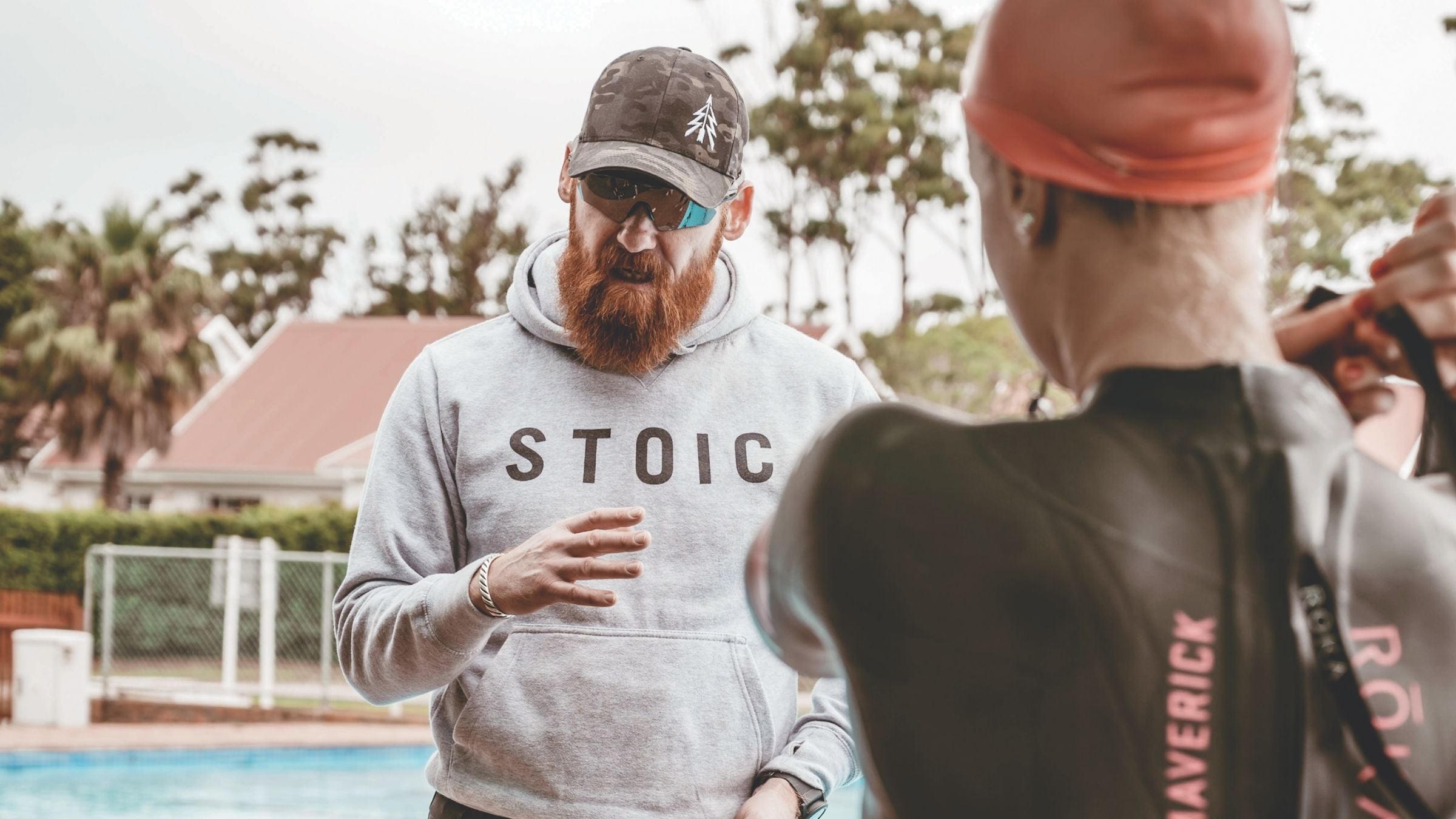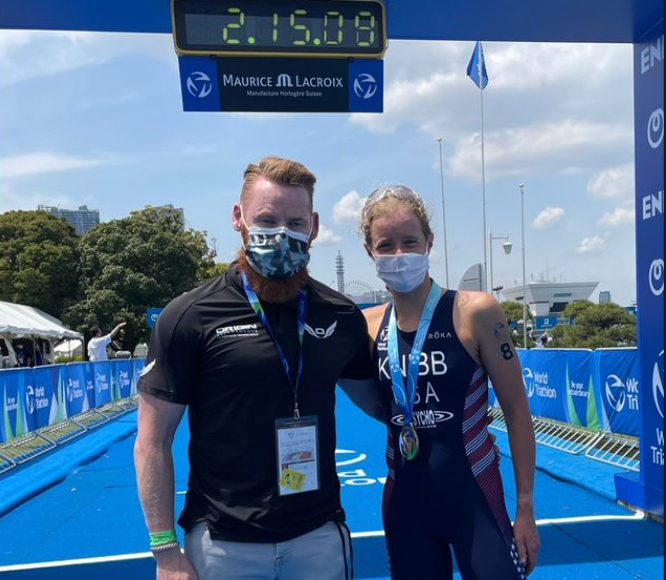The Unusual Story (and Unusual Coach) Behind Taylor Knibb's Overnight Success

If you’d told Taylor Knibb on Jan. 1 this year that she’d win an Olympic medal, podium at 70.3 Worlds, and beat Daniela Ryf in a head-to-head race, she might have told you to get your head checked. But there’s one man who says he knew exactly how her 2021 season would play out—and that’s her coach, Ian O’Brien. The former British Army Recon Commander (who served for 16 years and completed seven tours of duty) arguably has the most interesting background of any endurance coach you’re ever likely to meet. It’s no doubt this, coupled with his unconventional approach to training and racing, that has helped him guide Knibb to so much success in such a short time.
Knibb won our Breakthrough of the Year award: Triathlete’s Best of 2021 Awards
Ian O’Brien: The man, the mission
“I never had any intention of being a full-time coach,” O’Brien said. “After the Army I intended on going back to school and doing something in business.” But, as with so many triathletes, after being a recreational track runner then coach, he inadvertently found himself training for a triathlon and soon coaching it too.
“When you’re training your troops you’re a coach anyway,” he said, hinting at what is one of many crossovers between his former career and his current one. And as his own tri training developed, he started a tri squad at the prestigious Royal Military Academy at Sandhurst in the U.K. And it was this that led him not just across the Pond, but towards his next career.
He left the British Army in 2012 to begin working as head triathlon coach at West Point, a position which, after two years of success, then led to him being talent spotted by Team USA and being pulled into the national development squad.
O’Brien said: “I soon realized that if I was going to be a coach, I wanted to be an Olympic coach, a high performance coach. That just fitted in with all I’d done in the Army. The biggest crossover for me between the Army and coaching is how to help athletes formulate and train mindset.” Handling stress and dealing with pressure are such a huge part of elite racing that O’Brien believes a large part of his job is helping his athletes learn how to operate under stress, do their jobs, and perform. “There are so many things that athletes go through,” he said. “Training is about creating a belief cycle to help reduce anxiety and the pressure of racing.” This belief cycle is, O’Brien said, a significant part of what has helped set up Knibb for success this season.

O’Brien and Knibb: The timeline
While most people might think Knibb is something of an overnight success, it’s a lesser-known fact that she and O’Brien actually started working together back in 2015. “When I first met her, she struck me as astute, detailed, driven, polite—and that’s a huge thing for me working with athletes. I have fired athletes who don’t have good manners. I could see in Taylor many of the same traits as I’d seen in some of the best people I’ve worked with in the military.”
After he received an email from her asking no less than 50 questions, he realized he was liaising with someone who possesses “an unrelenting relentless and persistence to be the best she could be.”
“It impressed the hell out of me,” he said. “I remember thinking, ‘this girl wants it’—and that she’d be a very good intelligence officer.”
She began her elite racing career in 2016, winning every race she entered save for her debuts on the World Cup and WTS racing scene. “We put her in her first World Cup in 2016 and she came third, breaking away with Flora Duffy, then later that season she came 11th at WTS Stockholm when everyone was in Olympic race shape.”
O’Brien said he could see the talent was there, but people didn’t pay attention to her results back then—a trend he says he saw continuing this year. “People were still writing her off before races, which is really the best scenario ever. Security and surprise are the best ways to ambush.”
Although the pair parted ways in summer 2017, Knibb returned to the Origin Performance fold (O’Brien’s squad) in November 2020, and it’s then that their plans for their triumphant 2021 campaign began.
The breakthrough year: How it started
“It was really nice when Taylor got back in touch with me and said she wanted to work with me again,” O’Brien said. “I told her back then she had medal capabilities in Tokyo, although due to injuries, she was really only thinking about Paris, not Tokyo.”
After a short block of training, O’Brien—who prides himself on his unconventional training methods—said all signs were pointing towards the fact she stood a chance of qualifying for Tokyo, but it would mean automatic qualifying at the WTS race in Yokohama in May. That then became their focus. And it’s then, he said, that his emphasis on “the belief cycle” really came to the fore. And while the belief cycle might sound like something that’s not necessarily easy to believe, he explains it simply and with military precision: “Be bold, repeat being bold, repetition creates belief, belief creates confidence, confidence enables control, control develops capability.”
By setting seemingly unattainable goals for his athletes (sometimes, not all the time, and most often in the pool), O’Brien said he knows that then, when they actually achieve them, their belief soars. And since November 2020, he has worked diligently with Knibb to ensure her belief—in herself, her training, her capabilities—was 100% dialed when she stood on that start line in Yokohama for the U.S. Olympic qualifying race.
“We knew she would need to have about a 90-second buffer coming off the bike in that race, and she had two minutes.” In short, much like a military mission, O’Brien informed Knibb what he thought she’d need to execute the race successfully—and she hit the target.
After she’d crossed the line, secured her Olympic spot and the tri world started asking who she was and where she’d come from, the stoic Brit was quick to ensure he didn’t get caught up in any of the hype. “My job is to be a rock, to carry on, to keep going, regardless of whether my athlete does well or not. They can have their fluctuations, but I’m the same, the rock.” And anyway, he said, he already knew how the race would play out if all went to plan for Knibb. “My expectations and belief in her have always been there.”
Yokohama and beyond
With her Olympic spot sewn up, Knibb and O’Brien refocused on Tokyo, where she finished 16th in the individual event and won the silver medal in the mixed relay event. “Tokyo was actually the only race this year [the individual race] that didn’t go to plan,” O’Brien said. But it was after returning from the Games that they decided it would be fun—and extremely worthwhile—to take on a more “exploratory” approach for the remainder of the season. Given that she already spent a great deal of time training with 70.3 champion Jeanni Seymour (another of O’Brien’s athletes who achieved some standout results this year), it made sense to both coach and athlete that she might jump into her first 70.3, especially as it was in their home base of Boulder, Colorado.
RELATED: U.S. Olympian and Collins Cup Star Taylor Knibb’s Workouts
Time to explore
“Really after the Olympics, the focus shifted to how to learn new things, how to grow for next year, how to win, what are the best things for Taylor, and so on. We decided it was time to try new things and that’s exactly when 70.3 Boulder came into the plan.” And much like at Yokohama, Knibb took everyone by surprise, riding away from a high-caliber women’s field on her road bike with gels stuck to the top tube.
“A lot of her training had been about pushing it on the bike and I was training her to be a time trialist, so we capitalized on that,” he said. “It was so much fun. We had been through every part of the course, gone over what power she should ride for every section, and we knew because she was on a road bike she needed to hammer every corner, but on the straights and flats she had to stay as aero as possible.”
It was a decision that caused many armchair experts’ tongues to wag, but O’Brien knows his bikes and knows his athletes: “There’s no way she had enough time to adapt to riding a TT bike, either before Boulder or before 70.3 Worlds. It would have been reckless. She knows what she can do on that bike and it changes everything when you jump on a new bike.”
It’s this level of confidence in all that he does that he feels, to some extent, has helped Knibb raise her game. “The level of belief she has in me is key. Physiologically, she responds to structure that is prescriptive; she will always do what needs to be done, and while she understands the mental side, she gets the physical stimulus too. We’re all about designing training that reflects the demands of competition, but it’s a collaboration and she’ll present ideas for her own training too.” O’Brien said he prides himself on building a strong team around each of his athletes, and with Knibb, the work she did with strength coach Erin Carson and chiropractor John Minen really helped ensure she was a well-rounded, resilient competitor.
Of course, from 70.3 Boulder she was selected to represent Team USA at the inaugural Collins Cup, where she continued with her 2021 theme of surprise, but this time doing so more boldly than ever before by defeating four-time Ironman world champ Daniela Ryf in their head-to-head match-up. While O’Brien is quick to note that he felt Ryf was not at her best that day, he does acknowledge that this helped keep Knibb’s name in lights and it felt, by this stage of the season, that she was almost unstoppable.
RELATED: Triathlon Twitter Stans Taylor Knibb, Forever
“It meant that going into 70.3 Worlds she had great momentum and racing confidence,” he reflected. He also credits her focus, her flexibility at being able to adapt to new goals very quickly, and always being open to collaborating on new plans and new ideas. In fact, he says it is this combination of collaboration, accountability, and belief that he feels were the biggest factors in her success this year. And while plans for 2022 are still very much embryonic, they know that there will again be a mix of ITU racing and some 70.3 outings too.
And while it would be easy for many coaches—and athletes, too—to get carried away, excited, or even complacent by the extraordinary success Knibb and O’Brien have enjoyed this year, this coach is instead more muted when it comes to talking about 2022 and beyond. “Taylor has her goals, of course, but really with an athlete like her, it doesn’t matter what your goal is, she’ll always want to move on to the next one, she’s always going to want to be better.”
It is this continual striving for excellence, attention to detail, drive, ambition, and focus that will no doubt lead Knibb to the very brightest of lights in our sport. It has been tremendous to watch it begin in 2021, and with O’Brien by her side, it truly feels like the journey is only just beginning.